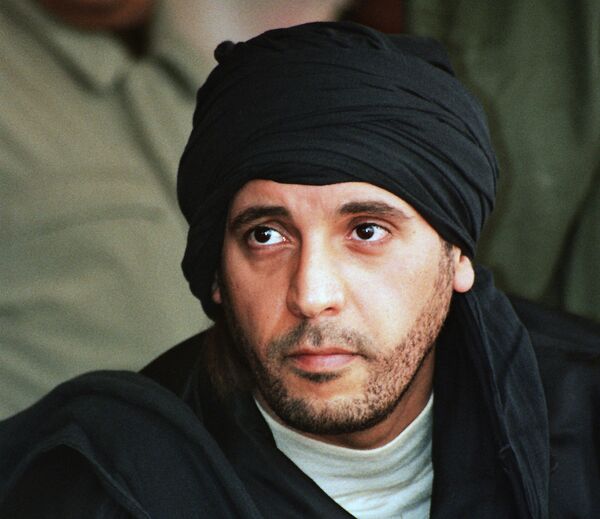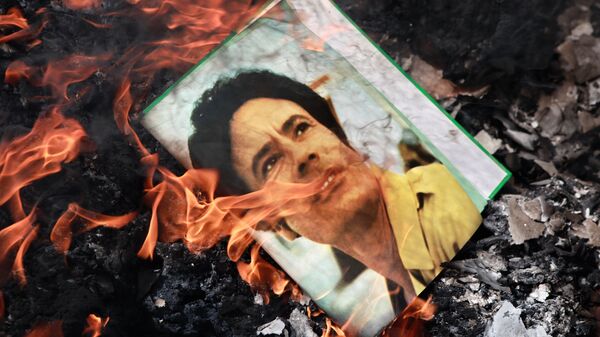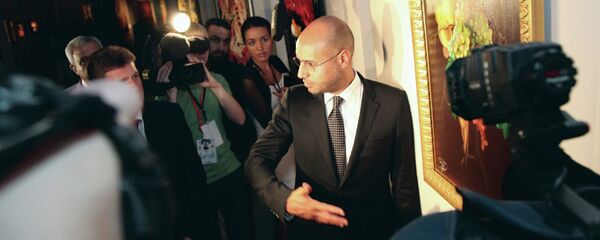The recent scandal involving the desecration of a Libyan flag in Beirut and Libya’s subsequent refusal to participate in the League of Arab States’ summit in Lebanon has triggered a crisis in relations between the two countries, as influential Lebanese political party known as the Amal Movement continues to demand that Libya reveal the fate of its leader, Musa al-Sadr, and his two companions, who vanished in Tripoli decades ago.
READ MORE: Lebanon Unlawfully Keeping Gaddafi's Son in Prison — Libyan Parliament Speaker
Tensions between Libya and Lebanon have cast a spotlight on the fate of one of the sons of late Libyan leader Muammar Gaddafi, Hannibal Gaddafi, who has remained imprisoned in Lebanon since 2015, where he is charged with withholding information related to al-Sadr’s disappearance.
For the first time since he was incarcerated, Hannibal Gaddafi agreed to answer a few questions in an exclusive interview with Sputnik, which was conducted via his official representative Reem Youssef el Debri, revealing how he was kidnapped and what he really knows about the al-Sadr case.

Sputnik: Who kidnapped you in Syria and how?
Hannibal Gaddafi: I was kidnapped in Syria by an armed gang on 6 December 2015. I was illegally moved from Syria to the Bekka region of Lebanon; the kidnappers used the lane reserved for the military in order to prevent the Syrians from searching their car. I was held there for a week; they tortured me both physically and mentally in an attempt to force me to divulge information related to the 1978 disappearance of Musa al-Sadr and his two companions — Sheikh Muhammad Yaacoub, whose son orchestrated my kidnapping, and Abbas Badreddine.
Sputnik: You were detained in Lebanon on charges of withholding information on the Musa al-Sadr case. Is there any official investigation being conducted into this case, or court proceedings related to it? Do you actually possess any information related to the disappearance of Musa al-Sadr and his two companions?
In 1982 the case was submitted to the Lebanese Judicial Council. In 2008, my father, Muammar Gaddafi, was accused of kidnapping Musa al-Sadr and his companions.
However, since 1981, I was never a part of this case, neither as a suspect nor as a witness or the accused.
Therefore, my detention has nothing to do with this case; I was detained simply because I’m the son of Muammar Gaddafi.
After I told the judge in charge of the case that I have no information related to Musa al-Sadr’s disappearance, I was accused of withholding information related to the case. The thing is, I was only two years old when these events transpired in 1978.
Sputnik: Do your wife and children visit you? Where are they now?
Hannibal Gaddafi: No, so far they have been unable to visit me. I worry about them a lot. They are not safe in Syria due to the events taking place there, and no one can take care of them. They need their father.
READ MORE: Gaddafi's Son Supports Libya Presidential Vote as Soon as Possible — Report
Sputnik: What is your current physical condition and the state of your health?
Hannibal Gaddafi: My physical condition is unsatisfactory. I suffer from chest pains, respiratory insufficiency, pains in the small of my back, as well as from skin problems caused by the lack of sunlight. Also, I had my nose broken due to the beating I sustained during my kidnapping, and I have a haematoma which I also sustained back then.
I would like to note that I request the UN to send a team of doctors to visit me in prison so that they can officially ascertain my current condition.
Sputnik: What are your confinement conditions?
Hannibal Gaddafi: The conditions in the prison are unacceptable. Also, I’m not allowed to contact media, and everyone who visits me gets barred from entering Lebanon in the future.
READ MORE: Belgian Finance Ministry Searched by Probe Into Withdrawal from Gaddafi Accounts
Sputnik: Do you have any plans to participate in politics after your release?
Hannibal Gaddafi: It’s too early to talk about it. Right now I cannot speculate about this matter or make any decisions.
I would like to point out that while working in Libya, I never held any positions in the security services – I was just an adviser on cargo shipping.
We also count on Russia’s greater role, as a great power, in dealing with injustices like this. I thank Russia for its efforts aimed at facilitating my release.


